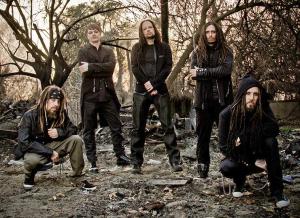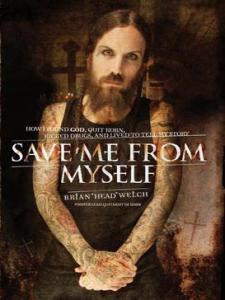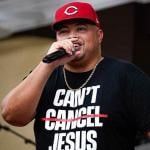
Brian “Head” Welch is a celebrated musician as one of the two guitarists from the pioneering nu-metal band Korn. And just like the rockstardom gods promised, with fame came a sudden excess of money, groupies, and all the substance misuse between. However, behind the curtain, Brian was struggling, seeking something to save him from himself. As it turns out, that something was Jesus Christ.
Early Life
Born in Bakersfield, California, 1970, Head always felt like an outcast. His disconnected perception of himself was exasperated by the bullies who picked on him in school, and he stumbled as he tried to find his place in the world. That is until he picked up the guitar and put in the hours, developing a distinct down-tuned style that eventually became synonymous with the genre he was inadvertently inventing. After jamming with some local musicians, he joined up with three members of the recently broken-up band L.A.P.D., and in 1993, they recruited singer Jonathan Davis. Together, they formed the seedling of Korn, which sprouted and then erupted in a manner the world had never heard before.
Korn Take Over Everything

Korn’s 1994 self-titled debut worked like shears to the metal landscape. At first, they were an entity nobody knew what to do with. But then they abruptly became the blueprint every heavy band attempted to emulate. Davis’ disturbing lyrics detailed his traumas with child abuse and drug addictions, infecting the scene with an unusual brand of unhinged honesty. But it was the backing instrumentation that successfully fused the rumbling bass of hip-hop with the primal guitar tones that bit through the genre standard. The result was an unprecedented sound later packaged as nu metal. This style developed rapidly with Korn overseeing the tsunami, most notably with their third album, Follow the Leader. It singlehandedly flooded the underground to breaking point, ultimately overflowing into the mainstream, accepted by the cool kids on MTV.
To give you a statistical demonstration of Korn’s conquest, one only has to mention their 40 million records sold worldwide, along with two Grammy Awards out of eight nominations. This newfound popularity blasted Korn into teenagers’ bedrooms across the globe, and the horrified parents naturally flared in defence. The distorted screeches of Head’s guitars with Davis’ wails about sex and torment petrified the adults, and Korn quickly earned the reputation as an “evil” band. Without a chance, they were hastily lumped into the satanic panic category that so many metal outfits unfairly found themselves.
Korn vs. Religion
Truth be told, Korn songs hardly ever mention religion. Nevertheless, there are some minor instances to analyse, noting that, yes, their perspectives were not particularly favourable. For one example, Hollow Life from their 2002 record Untouchables features the following lyrics:
“Is there ever any wonder why we look to the sky?
Search in vain, asking why?
All alone, where is God? Looking down?
We don’t know.”
— Hollow Life lyrics
Alone I Break

Be that as it may, Korn were not shy of indulging in the rockstar extravagance many would consider sinful, which included narcotics and engaging in sexual acts with younger fans. These unsustainable lifestyle choices manifested differently for each member, with Jonathan Davis going sober in 1998 and drummer David Silveria quitting the band in 2006. But for Brian Welch, his demons spawned with a particular breed of darkness. He developed a dependence on alcohol, methamphetamine, Xanax, and sleeping pills, while he suffered on a spiritual level far more profoundly than the rest of his bandmates. Head knew he could not go on like this.
What happened next could be considered a minor miracle of Christ. In desperation, Head fell to his knees, praying for salvation. And he received it. In a big way.
Head Finds Jesus Christ
“The crazy thing is I had an experience with something from another dimension. And it wasn’t the religion—going to church and being a good boy—it was, like, I felt something come into my house, and I can’t explain it to this day. But I believe that it was Christ doing something in me. So that was real. That was very real.”
— Brian “Head” Welch (Consequence, 2021)
According to Head, his desire to use drugs vanished in an instant as Jesus blessed him with a clear path out of his madness. Step one was to quit Korn after almost 12 years of guitar service. He then went straight to the Jordan River to be baptised. Following this, Head put his money where his mouth was by using his Korn riches to build orphanages in poverty-stricken regions of India called “Head Homes“.
Head vs. Korn
At the same time, Head did not renounce his love for the craft. He released his debut solo album and published his first book, both titled Save Me from Myself. These projects detailed his journey with Christ out of addition and set the stage for many more artistic endeavours, such as the foundation of his Christian metal band Love and Death. However, this tell-all attitude aggravated his former pals, and some strong words were exchanged through the press and the music.
For instance, there are Jonathan’s lyrics on Hypocrites from their first album without Head, named See You on the Other Side.
“Your messiah was never mine,
Hypocrites,
Weeping rose of Jeremiah,
Drops of blood drip off your petals,
Representing all our tears,
In a ring of burning metal”
— Hypocrites lyrics
And on the “Untitled” album directly after that, with the song Love and Luxury:
“I read your little book and ha, ha, ha!
You need a reason to believe, a reason to deceive,
A reason for the song you’re singing.
And everything you do makes perfect sense to you,
So why is your alarm bell ringing?
You say you know how it feels inside of me,
Lost and alone and no love or luxury,
Come on inside and hear the song that’s constantly judging me,
Don’t you think you should move on?”
— Love and Luxury lyrics
Reconciliation
“I heard that they were concerned about the book. I sent them a copy and put a note in there and said, ‘I love you guys. I didn’t trash you like people say. Read it yourselves. It is what it is.’ And now they’re doing interviews, and I’ve read that they’re totally cool with the book, and it’s not what they thought it was going to be. So everyone’s happy. But, now they’ve got two songs hating on me on their record. But it’s cool. It’s all good. I love them, they love me. I think maybe I deserved those songs because of some of the stuff that I said after I quit the band.”
— Brian “Head” Welch (Beliefnet, 2007)

Tensions were high. However, due to Head’s strive for righteousness, he refused to engage in too many heated conversations and instead focused on his faith and solo music career. Korn calmed down and did the same, releasing four albums without Head’s input. The time apart proved healthy for all parties, and as the dust settled, everyone noted their roles in the split. Even Head later reflected on his sudden extreme faith as perhaps a problem in itself.
“I think I went too far with it. And I got obsessed with it, just like I was obsessed with the drugs. And I had to come out of that and find normalcy, because there’s nothing worse than a freakin’ irritating religious person just shoving it down your throat.”
— Brian “Head” Welch (Consequence, 2021)
From Christian to Korn
The group may have remained on talking terms, but fans did not expect what would occur at the Carolina Rebellion festival in 2012. Out of nowhere, Head walked on stage to perform the band’s monster hit Blind, the first show they’d played together in seven years. Apparently, this surprise was as unexpected to Korn themselves. Head opted to join at the last minute after learning the band’s tech guy had prepared an extra guitar for him “just in case”. The rumour mill spun over time, hypothesising that Head had rejoined the group. Korn finally confirmed this in 2013, revealing Head had been recording with them in secret.
“I followed God right back into Korn, and He’s there and I’m not separated from them or the fans any longer. He says in the Bible He’s going to restore all things. God is so good that He’s restored me in that way. He gives you glimpses of that by restoring your life. He restored me in a way that’s unique to me.”
— Brian “Head” Welch (The Christian Post, 2019)
The resulting project was 2013’s The Paradigm Shift, his first release with the band in ten years. The reception was warm, but the band truly found their groove with the following release, 2016’s The Serenity of Suffering. AllMusic wrote: “The Serenity of Suffering is a welcome return to a time when Korn were at the top of their game. It’s one of their best albums, almost heart-warming in its cathartic familiarity”. Meanwhile, The Guardian praised it as “monstrously heavy from the opening riff onwards, this is classic Korn.”
Is Brian Welch Still Christian?
Korn with Head have released two more albums since then, and they show no signs of slowing down. Naturally, fans are delighted, but many wonder: is Brian Welch still a practicing Christian? Head addressed the questions on his YouTube channel, where he appeared to say his spirituality holds firm, even if he isn’t too quick to label it.
“When I first became a Christian, I was coming off of methamphetamines. And I had a massively powerful encounter where God was revealing himself to me. And so those two sides of the coin—coming off of meth and a powerful encounter—I didn’t know how to react and I just went out and I was overzealous, I was obnoxious with my faith, and it took me a while to bring it down. I still share my faith, my personal stories of things that I go through in a non-religious way. I try to be very spiritual, but like, ‘This is how it’s helped me, da da da…’ I have an amazing relationship with God and I know where that stands. So I’m very confident in that.”
— Brian “Head” Welch (YouTube, 2022)
Final Thoughts

Regardless, one thing for sure is that Head’s message can reach a wider audience as a member of Korn. And, more importantly, Korn’s evil reputation was always unfairly overstated anyway.
In actuality, beneath their fierce growls and gritty guitar licks, Korn were about facing your issues. Their lyrics publicly battled demons without fear of ridicule, giving confidence to agitated teens who grew as people thanks to the outlet Korn granted them. Whether this is the way of the church or not remains debatable. Still, in terms of self-reflection, suffering for what you believe in, and connecting to a community, perhaps we can compare Korn’s journey to the teachings of Jesus Christ, after all.













